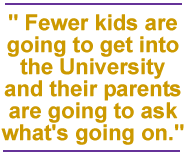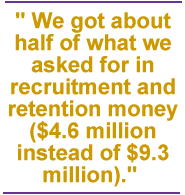 THE UNIVERSITY OF WASHINGTON ALUMNI MAGAZINE
THE UNIVERSITY OF WASHINGTON ALUMNI MAGAZINE
 THE UNIVERSITY OF WASHINGTON ALUMNI MAGAZINE
THE UNIVERSITY OF WASHINGTON ALUMNI MAGAZINE
|
BriefingsBudget Plan Could Mean $27 Million Cut for UWLawmakers are waiting for a state revenue forecast due March 8 before they will write a 2001-03 budget that could severely impact enrollment, tuition, faculty salaries and other issues crucial to higher education and the University of Washington. "We expect to see a budget come out of the Senate about a week after the revenue forecast," says Dick Thompson, '67, the UW's director of government relations, who monitors higher education issues in Olympia. The Legislature is set to adjourn on April 22, although some observers are predicting it will have to go into special session to reach a budget compromise.  Both houses are currently working off of Gov. Gary Locke's budget proposal released Dec. 19, which was disappointing for higher education. Under Locke's plan, the UW did not get the full salary increases and enrollment boosts it asked for, says Thompson. In addition, Locke's proposal would result in a $27 million cut in the UW's base budget. "We took a $6 million cut in non-instructional costs, $12 million in underfunded utility costs, $7 million in salary increases that were authorized but not covered, and about $2 million in inflation," explains Thompson. "That works out to a $759 cut per student. "These cuts are real and programmatic. Fewer kids are going to get into the University and their parents are going to ask what's going on," he warns. Thompson considers Locke a strong supporter of higher education, but the governor was boxed in by diminishing state revenues and spending limits imposed by Initiative 601. "The indications are that the governor's budget may well be the high water mark, and that the Legislature will have a tough time doing better or even as well as the governor has done," he says. The governor's numbers did not come close to the UW's request. For example, the UW asked for 700 new full-time students at its three campuses. Locke proposed 305 extra students, plus 160 for a new technology institute at UW Tacoma. All four-year state campuses asked for a 6 percent salary increase in 2001 and a 4 percent hike in 2002. Locke gave them 2.2 percent and 2.5 percent instead.  "We got about half of what we asked for in recruitment and retention money ($4.6 million instead of $9.3 million)," notes Thompson. Other disappointments were no funding for diversity and outreach initiatives (the UW had asked for $2.2 million), for teaching technology efforts or for research matching funds. The UW's total request for state general funds was $772.4 million. Locke's total for the UW was $709 million. One bright spot in Locke's plan was an additional $7.5 million to launch a technological institute at UW Tacoma to address the shortage of bachelor's and master's degree students in high-tech fields. The plan calls for $4 million in matching private dollars and would reach full enrollment by 2003. The governor's budget also set aside $1 million to fund the Advanced Technology Initiative, where high technology departments link with industry to create research environments. Possible areas of investment include photonics, high-tech home health care, computational neuroscience and construction research. Even more bleak are the numbers for capital improvements to the three campuses. For example, the UW asked for $50 million in minor work repairs; the governor proposed $20 million. In deferred maintenance, the UW asked for $40 million and the governor set aside $7 million. The plan did not fund an early start for the UW's new biosciences building located at the corner of 15th Avenue N.E. and N.E. Pacific Street, and most expansion plans for the Bothell and Tacoma campuses were put on hold. "If anything, the capital budget is an even sadder story for the UW," says Thompson. Because the Legislature is still writing its budget, now is a good time for alumni to contact their representatives about higher education issues, says Thompson. To stay informed, call the UW Office of Government Relations at (206) 543-7604 or e-mail govrel@u.washington.edu. To contact your state legislator in Olympia, call 1-800-562-6000. Useful Web sites include the UW Government Relations Home Page and the Washington Legislature Home Page.
|